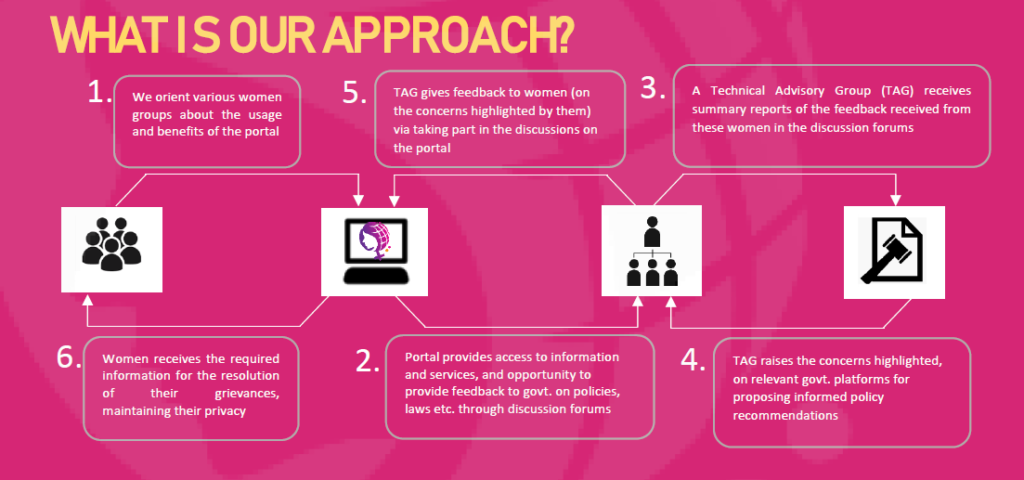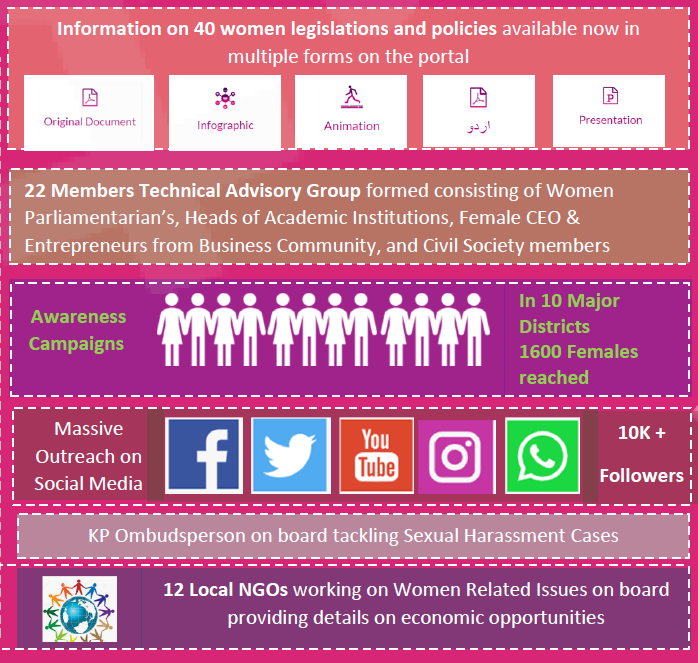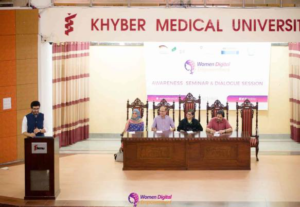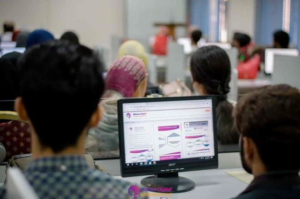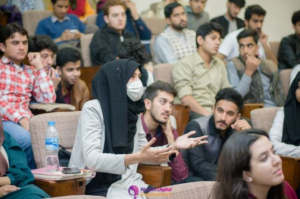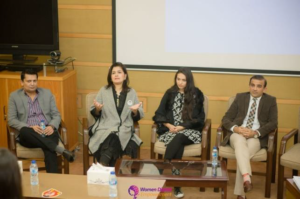The 1st Women Digital Empowerment Portal for the women of Khyber Pakhtunwa – the second largest province with more than 50% women population – now caters to the Social Economic Political and Legal needs of W O M E N.
What is our approach?
But why was this needed?
1. Low presence, participation & engagement in decision-making & development processes
2. Lack of economic opportunities & access to information in all spheres of social, cultural, political, economic, legal, and personal life at their doorstep.
3. No platform available to specifically target women of marginalized communities addressing their needs or contains special features to follow up on any of their issues in a formal manner
4. Need for coordinated and joint efforts of all public sector departments in implementation of Khyber Pakhtunkhwa (KP) Women Empowerment legislative Framework
5. Overcome the considerable gap between the intention of women empowerment via ICTs in KP & advance SDG 5
So… what is the payback?
Impact we foresee in…
…Short term:
Capacitating the Demand & Supply Side
Capacity Building of Women
Building capacities of women at all three levels i.e. individual, organizational and institutional is the core component of the pilot project. Women will be trained in IT skills and in the utilization of the digital platform. Women will be empowered with the knowledge to know their rights (right to information), understand their role and effectively contribute in the social and economic development processes. The targeted material provided on the portal intends to increase their knowledge on integrating gender into policy making process, techniques to review existing policies and plans, advocacy skills to raise their concerns (such as direct access to KP Ombudsperson), understanding role of women in promoting Sustainable Development Agenda 2030, and scope for women participation in decision making and development planning etc. Success Stories of prominent, active and successful women in their fields recorded during the course of action will also be used as a tool for inspiration.
Capacity Building of Counterparts
The Khyber Pakhtunkhwa Social Welfare and Women Empowerment Department (SWD) is the key partner in the province to ensure ownership of the project while the Institute of Management Sciences, Khyber Pakhtunkhwa Women Parliamentary Caucus (KPWPC), Khyber Pakhtunkhwa Commission on the Status of Women & Khyber Pakhtunkhwa Information Technology Board (KPITB) are engaged as primary stakeholders. During the project, efforts are made to improve the implementation capacities of the government counterpart so to enable them to take over the project, make it a sustainable, upscale and further integrate with other ongoing women related initiatives. Women wing of (SWD) will take the feedback and policy recommendations further as an input in the policy formulation and planning processes and coordinate with relevant public sector departments such as KPWPC that can play very important role in pro-women legislations and raising the concern in the Provincial Assembly.
…Medium term:
Initiating the State Citizen Dialogue
An increased number of Women, being beneficiary, will be more informed, aware and empowered with knowledge and skills to know their needs, express their choices, raise their concerns and provide feedback on government interventions, policies and plans via digital platform. Their participation can also be helpful in initiating gender-sensitive governance and implementing gender-sensitive reforms. Alongside, a mobile app will also be introduced so more women can have feasible access and convenient approach to use the portal.
In close coordination with SWD, prominent and active women groups, public sector organizations and national/International NGOs will be invited to join the platform and contribute to the discussion. This will provide them an opportunity to create linkages with the women community, network and promote their work and eventually enhance their net worth.
…Long term:
Creating virtual voice as the new pressure group and providing direct input stream in govt. policy making will create enabling environment for women to actively participate and contribute in the social and economic development processes. Gender sensitive policies and reforms across all sectors and at all levels would ensure equal access to services including health, education etc. and equal opportunities for women to prosper and become a well-informed, aware and valuable member of society. The ICT tool will prove effective in empowering women and girls by providing them home-based educational and employment opportunities. Such a development will instigate tremendous opportunity promoting women as valuable assets, inspiring them in technological pursuits and building their confidence and interest in the area that will positively impact their mobility, safety, labour force participation, and close skills gaps.
The significance of the digital platform is self-evident in face of technological spread in the past decade. The advent of IT solutions as the women digital empowerment portal will help redefine the traditional state-citizen relationship and provide the much-needed feedback loop. Secondly, it will help reduce the distrust between government and the citizens, stimulating the government to take action and a service to public on our part. The already available e-government portals lack the feedback mechanism, mainly working towards paperless and quick service delivery or deal with the provision of skills in very isolated world that does not have direct impact on digital inclusion of women.
Our partners particularly acknowledge GENDER as a quality feature of our work!
Introducing a digital platform as a feedback mechanism on government policies, plans and initiatives and particularly focusing on women, being the marginalized group, is a unique and innovative idea.
Academia!
‘IM Sciences feels proud in being able to give back to the society by doing things that will improve the wellbeing of people. With the Women Digital Empowerment Program, the institute hopes to do a lot for the women of our society. IM Sciences hopes to keep working on more of such programs in the future’ – Institute of Management Sciences, Peshawar
Civil Society!
‘The holistic and integrated approach offered by the portal aims to envision all the engines of the society (the public and private sector, media, academia, and the civil society) and align and synergize their energies and resources towards a shared destination to realize the true vision for the empowerment of women in Khyber Pakhtunkhwa’ – Lubna Haye Representative Aurat Foundation
The Government!
‘Women Digital Empowerment Portal is one way highlighting issues that women face and how women are supposed to be empowered and respected by society’ – KP Chief Secretary Muhammad Saleem Khan
‘I have talked several times about the Women Digital Empowerment Portal at the Women Parliamentary Caucus and highlighted the initiative in my parliament addresses so others can use it too’ – Ayesha Bano Member Provincial Assembly
Appreciation by Clients!
‘Initiatives such as Women Digital Empowerment Portal has given me a ray of hope for resolving more cases of harassment from the province which were earlier sent to Peshawar High Court’ – Rakshanda Naz KP Women Ombudsperson
Appreciation by Commissioning Parties!
’Swiss Development Corporation in partnership with GIZ supports the idea of empowering women in the digital field and particularly encourage the participation of women and youth in the development processes. I really hope this portal achieves the much-needed feedback loop in the state-citizen relationship and is able to lead by example, benefiting beyond boundaries”- Ahmad Ali Khattak Senior Programme Officer, Swiss Cooperation Office Pakistan
CLICK ME! to find out more!
Our contributions to enhancing gender equality and reducing gender-based discrimination and disadvantages
Our strategy focuses on three specific objectives; (1) To increase access to information on their rights; (2) To improve access to employment opportunities and skills for women; (3) To improve access to services.
These are achieved by:
• Enhancing the progress on social indicators for all women (educated, poor, working women, housewives) through provision of up to date information. We also aim at connecting these women with active NGOs working in the thematic area so they can have (a). access to employment opportunities, (b). support provided by these NGOs (such as legal support, gender-based violence and vocational skill trainings etc.). In addition, the dialogue sessions with eminent women leaders gives them the opportunity to connect and expand their networks and to improve their meaningful participation in socio-economic and political spheres of life;
• Contributing to the creation of an enabling environment in a safe space where they can engage in discussions; and
• Providing direct access to KP Ombudsperson in a personalized space where they can talk more confidently about the challenges they face with respect to sexual harassment and heal from experiences of oppressions.
How does our M&E system work?
Our results in the area of gender equality are clearly documented in GIZ’s M&E system. The gender-relevant aspects are explicitly mentioned in the RBM system and the indicators of the project to ensure that gender equality is adequately taken into account when steering and implementing the project and reporting to our commissioning parties. We have managed to strengthen a gender-sensitive approach and committed to fulfil policy requirements regarding the integration of cross-cutting issues into our RBM-system. The RBM system provides data that make it possible to measure and assess the intended objectives and results, also with regard to promoting gender equality. The results that the project intends to achieve are also depicted in the results model and progress on monthly basis is documented in the operational plan (master sheet). The fundamental purpose is to examine all results and activities for their gender relevance. We also involve our partners and other stakeholders in the strategic and steering decisions to better address integration of gender equality. This data will contribute to the project evaluation report (that will be carried out at the end of the project) and provide guidance for the offer design phase of a potential follow-on measure.
Gender equality cannot be achieved by individuals alone– how did we go about it? Whom did we cooperate with?
The project approach is based on the principles of consultations, collaborations and capacity development. We believe successful implementation and impact will depend on the joint efforts of multiple departments and interest groups therefore we engage academia, the government, civil society, media, business & community leaders and human rights activists. That per se is ‘gender equality’ for us.
What united us in all efforts to enhance gender equality?
SWD as a primary partner in the project, has the mandate for women’s development and empowerment in the province. However, lacks the resources & technical capacity, and requires coordinated and joint efforts of all public sector departments working for inclusivity of women’s voices to reach its target.
Institute of Management Sciences (IMS) as the key partner, has extensive experience in implementing development projects. On the onset, IMS has been involved in the development, design, production, delivery and dissemination of the women digital empowerment portal & project. Building capacities of the government counterpart, in this case Women Wing SWD, to take over the project after completion of the pilot has been the part of the engagement agreement with IMS. Besides, such experiences also contribute to the university’s ‘social integration and community development indicator ratings’ by the Higher Education Commission in Pakistan on annual basis.
Above all, the organizational, provincial, national & international obligations such as, Khyber Pakhtunkhwa Women Empowerment Policy Framework, National Action Plan, SDG 5, SDG 9.C, SDG 10.2 & 10.3, GIZ’s commitment to gender equality has been the major driving force uniting all sectors in the efforts to enhance gender equality in the Province.
Major challenges we encountered
1. Engaging more women and youth in the process
2. Low turnout rate of portal users in participation in online discussion forums. One possible reason for this limitation was citizens’ lack of awareness about the portal and its utility.
3. Continuation of necessary support from development partners in order to establish institutional integration of feedback mechanisms in existing conventional style of governance processes. Govt. processes are structured on top down approach without any organized method of incorporating citizens expectations in development.
What were the three key success factors?
1. Gender responsive & gender specific women digital portal as a hub of all women related activity
2. Our content on portal is accessible to all sorts of citizens. Rationale behind presentation of legislation, policies, and government initiatives in multiple formats on portal is to make it as easy as possible for a common citizen to access and eventually understand them.
3. Technical Advisory Group as a real representative committee of women leaders to listen to and promote women on relevant platforms.
http://wde.org.pk

 GIZ Gender Website
GIZ Gender Website